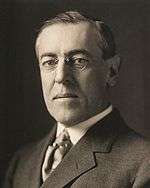Wilsonianism
Wilsonianism or Wilsonian idealism describe a certain type of foreign policy advice. The term comes from the ideas and proposals of President Woodrow Wilson (1913–1921). He issued his famous Fourteen Points in January 1918 as a basis for ending World War I and promoting world peace. He was a leading advocate of the League of Nations in order to enable the international community to avoid wars and end hostile aggression. Wilsonianism is a form of liberal internationalism.[1] Wilson learned from American history and applied that knowledge and democratic model to his ideas on international relations.
| ||
|---|---|---|
President of the United States
First term
Second term
 |
||
Principles
Common principles that are often associated with "Wilsonianism" include:
- Emphasis on self-determination of peoples;[2][3]
- Advocacy of the spread of democracy;[4]
- Advocacy of the spread of capitalism; and[5]
- Support for collective security, and least partial opposition to American isolationism.[6]
Historian Joan Hoff writes, "What is 'normal' Wilsonianism remains contested today. For some, it is 'inspiring liberal internationalism' based on adherence to self-determination; for others, Wilsonianism is the exemplar of humanitarian intervention around the world,' making U.S. foreign policy a paragon of carefully defined and restrict use of force."[7] Amos Perlmutter defined Wilsonianism as simultaneously consisting of "liberal interventionism, self-determination, nonintervention, humanitarian intervention" oriented in support of collective security, open diplomacy, capitalism, American exceptionalism, and free and open borders, and opposed to revolution.[7]
See also
- Imperialism
- Empire of Liberty
- Human rights
- Idealism in international relations
- International relations theory
- Nation-building
- New world order (politics)
- Open Door Policy
- Political realism
- Straussian Wilsonianism
- United Nations
References
- Stanley Hoffmann, "The Crisis of Liberal Internationalism, Foreign Policy, No. 98 (Spring, 1995), pp. 159–177.
- Erez Manela, The Wilsonian Moment: Self-Determination and the International Origins of Anticolonial Nationalism (Oxford University Press, 2007), pp. 41-42.
- Antonio Cassese, Self-Determination of Peoples: A Legal Reappraisal (Cambridge University Press, 1995), pp. 19-21.
- "Woodrow Wilson and foreign policy". EDSITEment. National Endowment for the Humanities.
- "Woodrow Wilson, Impact and Legacy". Miller Center. Retrieved 2018-01-07.
- Lloyd E. Ambrosius (2002). Wilsonianism: Woodrow Wilson and His Legacy in American Foreign Relations. Palgrave Macmillan. p. 51.
- Joan Hoff, A Faustian Foreign Policy from Woodrow Wilson to George W. Bush: Dreams of Perfectability (Cambridge University Press, 2007), p. 61.
Further reading
- Ambrosius, Lloyd E. Wilsonianism: Woodrow Wilson and His Legacy in American Foreign Relations (Palgrave Macmillan, 2002).
- Ikenberry, G. John, Thomas J. Knock, Anne-Marie Slaughter & Tony Smith. The Crisis of American Foreign Policy: Wilsonianism in the Twenty-first Century (Princeton University Press, 2009).
- Layne, Christopher. The Peace of Illusions: American Grand Strategy from 1940 to the Present (Cornell Studies in Security Affairs) (Cornell University Press, 2000).
- Smith, Tony. Why Wilson Matters: The Origin of American Liberal Internationalism and Its Crisis Today (2019) excerpt
- Throntveit, Trygve. Power without Victory: Woodrow Wilson and the American Internationalist Experiment (2017)

